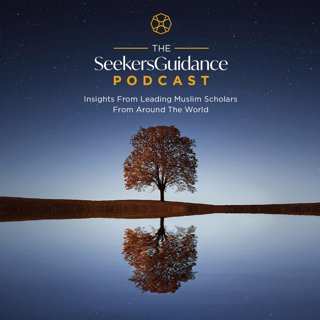
Embracing Excellence – 05 – Regular Devotions – Ustadh Amjad Tarsin
In this episode, Ustadh Amjad covers the section from Imam Haddad's Book of Assistance on regular devotions. After beginning with a reminder on the importance of structuring one's time, he comprehensively examines the routines of worship a seeker should have in his day. He encourages us to value consistency rather than excess, outlining the various acts of devotion -- prayer, Qur'an, seeking knowledge, remembrance, and reflection -- that makeup one's litanies (wird). He also discusses the inward and outward proprieties of one's devotions, prioritizing the obligatory and sunna and acts of worship, and the virtue of night prayer and other supererogatory prayers. This is part of the series presented by SeekersGuidance Canada in Ramadan 2019.
11 Touko 201941min

Embracing Excellence: 30 Steps on the Straight Path – 04–Inner and Outer Self , from Imam Haddad’s Book of Assistance –Ustadh Amjad Tarsin
Ustadh Amjad continues exploring Imam Haddad's Book of Assistance, a concise manual on the path to the Divine. In this section, he explains how the outward and inward aspects of faith fuse together. He highlights a prayer of the Prophet Muhammad (Allah bless him and give him peace) that Allah make his inward be better than his outward and his outward virtuous. He cautions against adorning one's outward while neglecting to purify oneself inwardly. In the same vein, he warns against occupying oneself with one's public appearance rather than aiming for the sincerity of devotion, for instance in our recitation of the Qur'an. This is part of the series presented by SeekersGuidance Canada in Ramadan 2019.
10 Touko 201927min

Embracing Excellence: 30 Steps on the Straight Path – 03 –Vigilance , from Imam Haddad’s Book of Assistance – Shaykh Faraz Rabbani
Shaykh Faraz Rabbani continues the series "Embracing Excellence: 30 Steps on the Straight Path" covering Imam Haddad’s manual The Book of Assistance. In this session, he looks at the third chapter, on Vigilance (muraqaba), which, he explains, is consciousness that Allah sees you, is with you, and is constantly aware of everything you do. Shaykh Faraz offers an explanation of the six solutions given by Imam Haddad for laziness in performing acts of worship and leaving sin. In addition, he explains how the awareness that God sees one leads to the beholding of the Divine. This is part of the series presented by SeekersGuidance Canada in Ramadan 2019
9 Touko 201944min

Embracing Excellence: 30 Steps on the Straight Path – 02 – Intention , from Imam Haddad’s Book of Assistance – Ustadh Amjad Tarsin
Ustadh Amjad Tarsin continues the series "Embracing Excellence: 30 Steps on the Straight Path" covering Imam Haddad’s manual The Book of Assistance. In this session, he looks at the second chapter, on Intention. He sheds light on the centrality of intention, its virtues, and how it can be used to bring life to our actions. Ustadh Amjad gives a "spiritual pro tip" on how to magnify one's actions through multiple intentions. He reminds of the great opportunity of the reward granted by Allah through intentions for good works. He also sheds light on the different types of intention. This is part of the series presented by SeekersGuidance Canada in Ramadan 2019
8 Touko 201931min

Embracing Excellence: 30 Steps on the Straight Path – 01 – Certainty, from Imam Haddad’s Book of Assistance – Ustadh Amjad Tarsin
Ustadh Amjad Tarsin covers the first chapter of Imam Haddad’s manual The Book of Assistance, on Certainty. He explains how we can nurture sincerity through the reflection in our lives and to our how this applies to our recitation of the Quran in Ramadan. Ustadh Amjad explains why certainty is seen as the first step, not the final, in this outline of the path to Allah. He also describes the three levels of certainty of believers outlined in the text. This is part of the series presented by SeekersGuidance Canada in Ramadan 2019, “Embracing Excellence - 30 Steps on the Straight Path” based on Imam Haddad’s Book of Assistance
7 Touko 201946min

02- The Art of Reading- Shaykh Ahmed Hussein El Azhary
In this new podcast series, Shaykh Ahmed Hussein El Azhary will discuss why the art of reading is critical for students of knowledge to master. One of the greatest barriers in mastering a science is the inability to read with structure and comprehension. In this series, Shaykh Ahmed will provide students with a detailed approach to rectifying this problem. In addition to offering practical tips and guidance in improving one’s reading and learning skills, Shaykh Ahmed will also elaborate on the development of the instrumental (foundational) sciences within the Islamic tradition and how they compare to medieval and modern theories of literary comprehension. In this second episode of The Art of Reading, Nabiel Mohamed asks Shaykh Ahmed El Azhary to discuss the historical development of Adab al Muṭāla' as a genre within the classical tradition, and the various factors which resulted in its emergence as a science. Furthermore, Shaykh Ahmed El Azhary discusses the various theories related to deep reading within the Islamic tradition, and he elaborates on two methodological examples of how to read and approach texts. Biography of Shaykh Ahmed Hussein El Azhary: Shaykh Ahmed El Azhary is a researcher in Islamic intellectual history and a teacher of Islamic traditional sciences. He’s currently a teacher of Hadith, Usūl, Logic, and Kalam at Rawdatul-Na`īm under the supervision of Habib `Ali al-Jifrī; and at Madyafat Shaykh Ismaīl Sadiq al-`Adawī (RA), a prominent learning center by al-Azhar Mosque in Cairo. Formerly, Shaykh Ahmed worked as a Lead Researcher at Tabah Foundation. He was appointed by Habib `Ali al-Jifrī to architect the philosophical framework of Suaal initiative – an initiative concerned with modeling an Islamic philosophical response to contemporary existential questions, supervised by Shaykh `Ali Jumu`ah, Habib `Umar and Shaykh Usama al-Azhary. Shaykh Ahmed continues to participate in Suaal initiative through essays, public lectures, and workshops. Shaykh Ahmed studied Anthropology at American University in Cairo and received his training in Leadership Communication from Tulane University and The University of Alabama at Birmingham. He is also a life-long learner. He holds a diversified portfolio of almost 50 certificates in a variety of subjects – extending from Teaching Character and Clinical Psychology of Children and Young People to Complexity Theory, Model Thinking and Conflict Analysis. Shaykh Ahmed began his journey of studying traditional sciences about 20 years ago. In addition to studying with scholars from al-Azhar, he had the privilege of studying with visiting scholars from Algeria and India in a one-on-one format and was thus given an exceptional opportunity to study and discuss advanced-level texts of different sorts and over a long period of time. Shaykh Ahmed has more than 70 Ijazas from scholars from all over the Muslim world.02-
1 Touko 201933min

Fasting is for Me, 11 Lessons on the Virtues of Fasting – Shaykh Faraz Rabbani
In this talk and presentation, Shaykh Faraz Rabbani expands on the various virtues and rewards of fasting. Shaykh Faraz bases his presentation on the seminal work (Siraj al – Talibeen) of the great Andalusian scholar, Qadi Abū Bakr ibn al-'Arabī. In this work, Qadi Abū Bakr discusses and describes the numerous qualities of a believer. One of these qualities is the state of fasting. Fasting is considered a prime act of the believer because it is a station of gratitude. Its reward is known only to Allah. Abu Hurairah (may Allah be pleased with him) narrated that the Messenger of Allah (peace be upon him) said: “Every deed of the son of Adam will be multiplied, a Hasanah(good deed) will be multiplied from ten to seven hundred times. Allah, the Mighty and Sublime, said: ‘Except fasting. It is for Me and I shall reward for it. He gives up his desires and his food for my sake.’ The fasting person will have two moments of joy: Joy when he breaks his fast, and joy when he meets his Lord. And indeed the smell of his mouth is better to Allah than the fragrance of musk.” [The Book of Fasting: Sahih Muslim] Based on the above narration, Qadi Abū Bakr lists 11 virtues and merits of fasting. Shaykh Faraz expounds on these 11 virtues and why fasting has a unique station with Allah. Furthermore, he reminds the audience that the station of fasting can be elevated if one refrains from backbiting, trivial discussions, and vulgar talk. The aspiration of a believer should be to attain complete consciousness of Allah. In closing, Shaykh Faraz advises the audience of increasing in supererogatory fasts, and the importance of being consistent when trying to achieve a worthy goal and objective.
30 Huhti 201958min

When Was the First Ramadan? Shaykh Hamza Karamali
Fasting became obligatory in stages -- first, the Prophet (peace be upon him) commanded his Companions (Allah be pleased with them) to fast the day of 'Ashura; then, Allah Most High revealed the verses that made it obligatory to fast Ramadan, but He gave the Companions (Allah be pleased with them) the option to pay a fidya; then, He revealed the verses that removed this option to pay a fidya.
29 Huhti 20197min





















